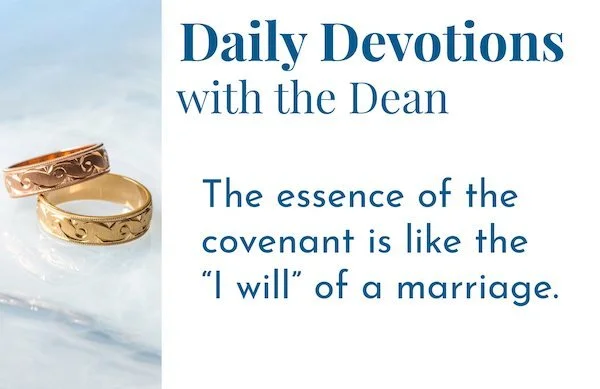Friday • 2/2/2024 •
Friday of 4 Epiphany, Year Two
This morning’s Scriptures are: Psalm 69; Genesis 24:1–27; Hebrews 12:3–11; John 7:1–13
This morning’s Canticles are: following the OT reading, Canticle 10 (“The Second Song of Isaiah,” Isaiah 55:6–11; BCP, p. 86); following the Epistle reading, Canticle 18 (“A Song to the Lamb,” Revelation 4:11; 5:9–10, 13, BCP, p. 93)
Welcome to Daily Office Devotions, where every Monday through Friday we bring to our lives that day’s Scripture readings, as given in the Book of Common Prayer. I’m Reggie Kidd, and I’m grateful to be with you this Friday in the FourthWeek of the Season After Epiphany. We are in Year 2 of the Daily Office Lectionary.
This morning, I find myself pondering two rich lessons, one from Hebrews about having a suppleness of spirit that fully receives the Father’s transformative work in our lives, and one from John about, well, letting Jesus be Jesus, and not projecting onto him our self-made plans for getting what we want.
Hebrews. When our spirits are malleable and supple, rather than hard and resistant, we allow ourselves to receive the Father’s formative touch in any situation. The writer to the Hebrews knows that we may face hostility from others, that we may face all sorts of “trials,” that we may face temptation to sin, and, accordingly, that we may face chastisement for sin (yes, the Father chastens).
We can know that in all of it, our heavenly Father is molding us after the image of his Son, “that we may share his holiness” (Hebrews 12:10). What a deep phrase that is. It is akin to 2 Peter 1:4’s “that you may become sharers of the divine nature.” One way to think of what the Father is doing in us is to picture ourselves on the far side of our deaths, waking up in a heaven in which we feel already (at least somewhat!) at home. We’re being shaped in the now to lessen the “culture shock” of that experience. Congruently, that process means the Father is using what he’s doing in us in this life to bring a bit of heaven into this world. #i.am.ok.with.that!
John. The central message, I think, from today’s reading in John is that Jesus goes about his mission despite other people projecting their goals and aspirations onto him.
“Now the Jewish festival of Booths was near” — John 7:2. The Feast of Booths is highly symbolic. It is the third of the three annual feasts that the law of Moses calls for: the Passover Feast marking liberation from Egypt (Exodus 23:14–15), the Feast of the Firstfruits marking the beginning of the harvest season (Exodus 23:16a), and the Feast of Booths (or Ingathering) marking the end of the harvest season (Exodus 23:16b). The Feast of Booths points forward to the great Sabbath at the end of time, when a world dominated by the power of sin (the age of the “flesh”) gives way to righteousness, peace, and hope (the age of the “Spirit”). This Feast is pregnant with typological significance for Jesus’s mission: his mission is to usher in the age of the Spirit.
However, Jesus’s brothers remain as confused about Jesus’s mission as those who sought to make him king at the Feeding of the 5,000. They want him to go public with his supernatural powers. To Jesus, such expectations amount to ego-projection, and are, at bottom, disbelief: “So his brothers said to him, ‘Leave here and go to Judea so that your disciples also may see the works you are doing; for no one who wants to be widely known acts in secret. If you do these things, show yourself to the world.’ (For not even his brothers believed in him.)” — John 7:3–5.
Jesus’s head fake (“No, I’m not going,” but then going anyway — see John 7:6–10) gives him space to go surreptitiously, and to choose the time and place of his Epiphany. He plans to manifest himself at this Feast as the one who will bring to pass that great future Sabbath when God’s Spirit will govern from sea to sea, and from pole to pole. But he’s going to usher in the Spirit’s rule in his own way (by being lifted up on the Cross—see John 3:14–15; 12:32–33) and in his own time (that is, not just yet).
Jesus wants us to know that he’s not a cipher for anybody else’s message. He’s not an avatar in anybody else’s game. He’s not a projection of anybody else’s ego-needs. He brings the beginning of the age of the Spirit…his way. His death will lead to his glory, his glory will bring the Spirit, and the Spirit will gush like rivers of living water from Jesus’s wounded side, to all who are thirsty for real life. #i.am.ok.with.that.too!
Be blessed this day,
Reggie Kidd+













